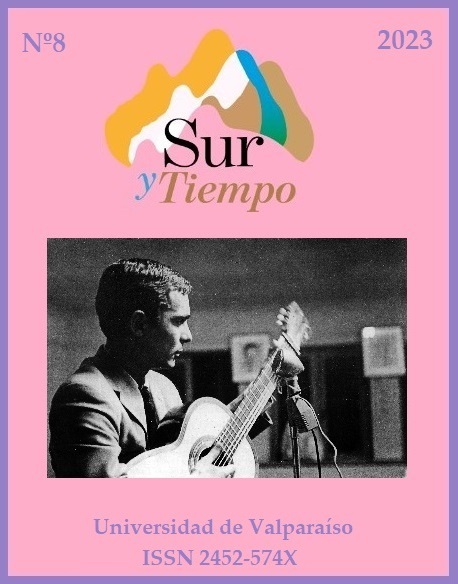Authorships that within 10 years will inspire Latin American thought. A prognostic exercise
DOI:
https://doi.org/10.22370/syt.2023.8.3860Abstract
The citations of 30-35 prose authorships of ideas originating in the region are studied, trying to hypothesize about what will happen to them in 10 to 12 years. The long-term objective is to present a type of prognostic work in the study of ideas, for which a research with 3 specific objectives is carried out. The first one consists of determining the relative level of citations of some of the most important figures of the prose of ideas that have marked lines of Latin American thought at the end of the 20th century and especially in the first two decades of the 21st century. The second is to present a set of criteria that would make it possible to base prognostic hypotheses. The third consists of formulating a prognosis based on the level of citations of these authors in a decade, between 2030 and 2035. For this case of prognosis, 3 methodologies are combined: consulting experts to determine the figures with the highest citations, my previous works and the use of existing information on the Internet between 2000 and 2020, to project what will happen towards the years 2032. -2035. Quantitative techniques, such as figures and relationships between them, are combined with qualitative and theoretical interpretations, that allow us to be given greater meaning. These prognoses can be of great significance for understanding the ethical trends that will be in play in 10 to 15 years in the intellectual ecosystems of Latin America and the Caribbean.
Downloads
References
Albert-Rodrigo, M. y G. Hernández-Martí (2013-2014): “Lo Sagrado y la Memoria: Hacia una Teoría Sociológica de la religión”, Revista Observaciones Filosóficas, 17.
Blumer, H. (1969): "Fashion: From Class Differentiation to Collective Selection", The Sociological Quarterly, 10 (3), pp. 275-291.
Castro Gómez, S. (1996): Crítica de la Razón Latinoamericana. Barcelona, Puvill.
Delgado López-Cózar, E.; N. Robinson-García y D. Torres Salinas (2012): “Manipular Google Scholar Citations y Google Scholar Metrics: Simple, sencillo y tentador”, EC3 Working Papers, 6, pp. 1-12.
Devés, Eduardo (2000): El Pensamiento Latinoamericano en el Siglo XX. Entre la modernización y la identidad. Tomo I, Del Ariel de Rodó a la Cepal (1900-1950). Buenos Aires-Santiago de Chile, Biblos-DIBAM.
Devés, Eduardo (2003): El Pensamiento Latinoamericano en el Siglo XX. Entre la modernización y la identidad. Tomo II, Desde la CEPAL al Neoliberalismo (1950-1990). Buenos Aires-Santiago de Chile, Biblos-DIBAM.
Devés, Eduardo (2004): El Pensamiento Latinoamericano en el Siglo XX. Entre la modernización y la identidad. Tomo III. Las discusiones y las figuras del fin de siglo. Los años 90. Buenos Aires-Santiago de Chile, Biblos-DIBAM.
Devés, Eduardo (2021): “'Ecosistemas intelectuales’ como unidad de análisis: los lugares donde se desenvuelven las ideas”, Izquierdas, 50, pp. 1-23.
Devés, Eduardo (2022): “Los estudios de las ideas navegan por muchas rutas: conversaciones, criterios y propuestas”, Wirapuru, 6, pp. 1-26.
Giudice, V. (2007): Teorías de los ciclos económicos. Disponible en web: https://economia.unmsm.edu.pe/org/arch_doc/VGiudiceV/publ/TeoriasCiclosEconomicos.pdf
Kuhn, T. (2004): La estructura de las revoluciones científicas. México D. F., FCE.
Lander, E. (Comp.) (2000): La colonialidad del saber: eurocentrismo y ciencias sociales. Perspectivas latinoamericanas. Buenos Aires, CLACSO.
Martínez-Barreiro, A. (2000): “¿Cómo configuran los españoles su vestuario?”, Revista Internacional de Sociología (RIS) Tercera Época, 58 (25), pp.77-98.
Nissen, C. y M. Härmänmaa (2014): “Introduction. The Empire at the End of Decadence”, en M. Härmänmaa y C. Nissen (Eds.), Decadence, Degeneration, and the End: Studies in the European Fin de Siècle. New York, Palgrave McMillan, pp. 1-14.
Wickberg, D. (2007): “What Is the History of Sensibilities? On Cultural Histories, Old and New”, The American Historical Review, 112 (3), pp. 661-684.
Downloads
Published
How to Cite
Issue
Section
License
Aquellos autores/as que tengan publicaciones con esta revista, aceptan los términos siguientes:- Los autores/as conservarán sus derechos de autor y garantizarán a la revista el derecho de primera publicación de su obra, el cual estará simultáneamente sujeto a la Licencia de reconocimiento de Creative Commons (CC BY-NC-ND 4.0 International). Está permitido el uso de este material con fines no comerciales dispuestos por el creador/es y las atribuciones otorgadas al editor. NO se permiten derivados de esta versión.
- Los autores/as podrán adoptar otros acuerdos de licencia no exclusiva de distribución de la versión de la obra publicada (p. ej.: depositarla en un archivo telemático institucional o publicarla en un volumen monográfico) siempre que se indique la publicación inicial en esta revista.
- Se permite y recomienda a los autores/as difundir su obra a través de Internet (p. ej.: en archivos telemáticos institucionales o en su página web) antes y durante el proceso de envío, lo cual puede producir intercambios interesantes y aumentar las citas de la obra publicada. (Véase El efecto del acceso abierto).





